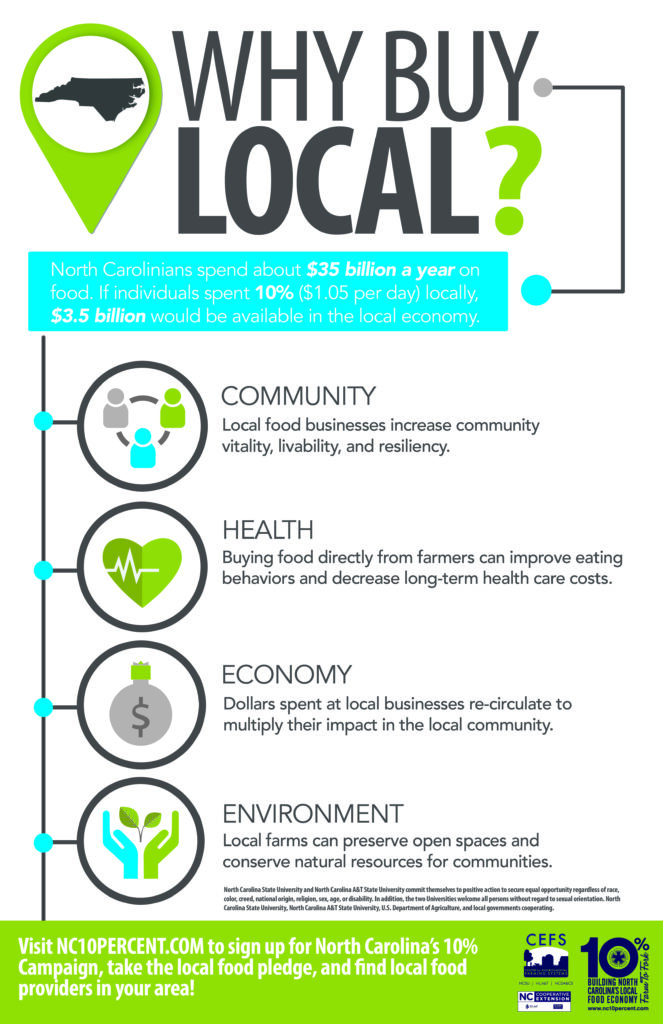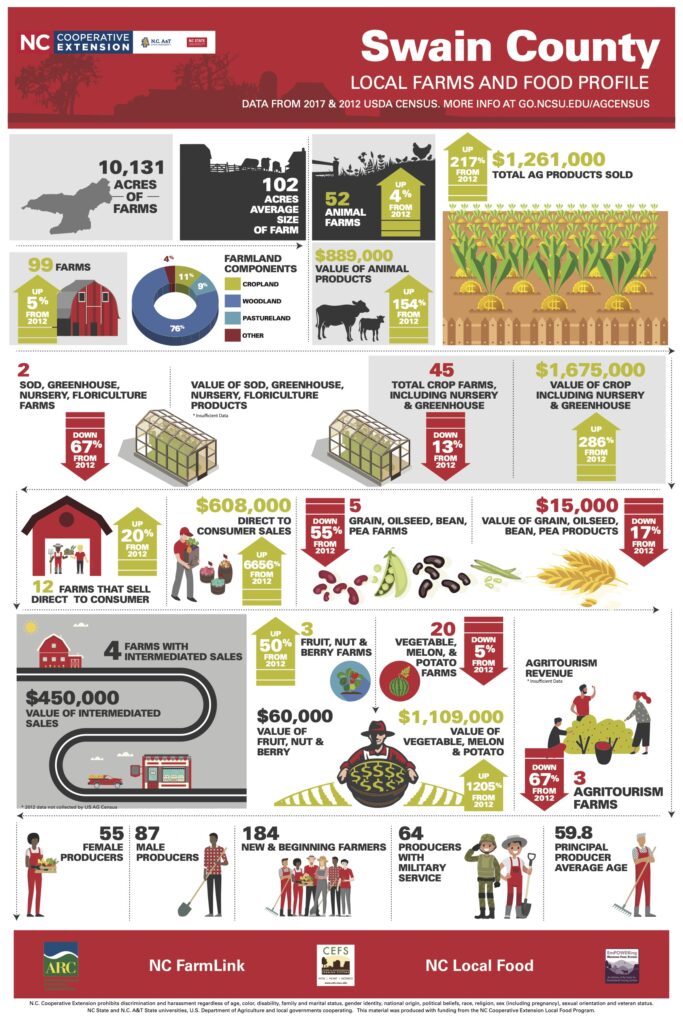What Buying Local Food Means for You
go.ncsu.edu/readext?866533
en Español / em Português
El inglés es el idioma de control de esta página. En la medida en que haya algún conflicto entre la traducción al inglés y la traducción, el inglés prevalece.
Al hacer clic en el enlace de traducción se activa un servicio de traducción gratuito para convertir la página al español. Al igual que con cualquier traducción por Internet, la conversión no es sensible al contexto y puede que no traduzca el texto en su significado original. NC State Extension no garantiza la exactitud del texto traducido. Por favor, tenga en cuenta que algunas aplicaciones y/o servicios pueden no funcionar como se espera cuando se traducen.
Português
Inglês é o idioma de controle desta página. Na medida que haja algum conflito entre o texto original em Inglês e a tradução, o Inglês prevalece.
Ao clicar no link de tradução, um serviço gratuito de tradução será ativado para converter a página para o Português. Como em qualquer tradução pela internet, a conversão não é sensivel ao contexto e pode não ocorrer a tradução para o significado orginal. O serviço de Extensão da Carolina do Norte (NC State Extension) não garante a exatidão do texto traduzido. Por favor, observe que algumas funções ou serviços podem não funcionar como esperado após a tradução.
English
English is the controlling language of this page. To the extent there is any conflict between the English text and the translation, English controls.
Clicking on the translation link activates a free translation service to convert the page to Spanish. As with any Internet translation, the conversion is not context-sensitive and may not translate the text to its original meaning. NC State Extension does not guarantee the accuracy of the translated text. Please note that some applications and/or services may not function as expected when translated.
Collapse ▲We’re all trying to make our dollar stretch as far as possible wherever we can. Get more bang for the buck, right? Decisions about where we put our financial resources are investment decisions. That includes our food budget dollars. That investment may mean more than you realize.
In this busy life, it’s not difficult to take our health for granted as we juggle the demands of daily living. Until illness steps in, impacts our health and the juggling turns into a jumble. In terms of our health, quality food and a nourishing diet helps fuel a strong and resilient body.
 Fresh, local produce makes a difference in quality fuel for the body. Local produce doesn’t have to travel as far and can be picked at its peak ripeness. A diet rich in vegetables and fruits can lower blood pressure, reduce the risk of heart disease and stroke, prevent some types of cancer, lower risk of eye and digestive problems, and have a positive effect on blood sugar, which can help keep appetite in check. Eating non-starchy vegetables and fruits may even promote weight loss. Once plants are picked the important nutrients they contain, like Vitamins A, B, C, and E as well as Calcium, Fiber, and Potassium, begin to deteriorate. The fresher the produce, the higher the nutrient levels, the greater the flavor and the better for our (and our family’s) bodies and minds. Quality counts.
Fresh, local produce makes a difference in quality fuel for the body. Local produce doesn’t have to travel as far and can be picked at its peak ripeness. A diet rich in vegetables and fruits can lower blood pressure, reduce the risk of heart disease and stroke, prevent some types of cancer, lower risk of eye and digestive problems, and have a positive effect on blood sugar, which can help keep appetite in check. Eating non-starchy vegetables and fruits may even promote weight loss. Once plants are picked the important nutrients they contain, like Vitamins A, B, C, and E as well as Calcium, Fiber, and Potassium, begin to deteriorate. The fresher the produce, the higher the nutrient levels, the greater the flavor and the better for our (and our family’s) bodies and minds. Quality counts.
Including locally produced foods in our meals can help build resilience in and strengthen your community. Where we live, work and play benefits from our food dollars. Not that long ago empty grocery store shelves emphasized foods journey from farm to the table. Getting onto the grocery store shelf depends on different parts of the food supply chain: transportation, processing, packaging, advertising, agribusiness, etc.… leaving the grower a very small percentage of the food dollar. In contrast, the money that we spend with local farmers and growers stays close to home and is reinvested with businesses and services in our community. It literally pays to know our farmer.
Local food benefits our environment as well. Here in NC we currently have 8 million acres of farmland, but we’re losing agricultural lands to development quickly. According to the American Farmland Trust, NC is the second-most threatened state when it comes to the conversion of agricultural lands to other uses. Our farmers and producers are our neighbors, growing their families here too. By investing our food dollars locally, we help maintain farmland and green and/or open space in our community.
Our neighbor farmers and producers are feeding their own families here too. They can tell us how the food was grown and harvested. When we know where our food comes from and who grew it, we know a lot more about that food and about our community.
Supporting the local food system makes sense. To find out more local food and local events, contact me at minda_daughtry@ncsu.edu.





